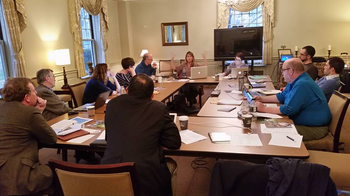The Presbyterian Mission Agency recently held a consultation at Pittsburgh Theological Seminary to begin the process of building a robust theological framework for its 1001 New Worshiping Communities movement. To date, more than 300 fellowships have been established through the Presbyterian Church (U.S.A.) evangelism effort.
“As church planting in the PC(USA) became organizationally heavy and capital dependent, most churches and congregations stopped establishing new churches,” says the Rev. Charles Wiley, coordinator of the churches office of Theology and Worship. “Part of the genius of the movement is that we didn’t try to figure everything out before we started—it began with a vision and encouragement—to act.”
Coordinator for 1001 New Worshiping Communities, Vera White joined Wiley in shaping the theological consultation. In her work with new worshiping communities, she sees the 1001 movement reflecting “change” in how “church” is defined in the PC(USA).
“As we shift to a more populous, grassroots, non-institutional, sometimes lay-led movement, we need our theologians more, not less,” says White. “It is important to have confidence that we are relying on solid theological and biblical principles.”
A small gathering of academic theologians, new worshiping community practitioners and leaders from within Presbyterian councils discussed in greater detail the brief definition of new worshiping communities developed when the 1001 initiative started in 2012. They also considered how to move into a new and unknown future, by connecting to Presbyterian roots.
“Our Reformed tradition and history have much to teach us,” says White, “about evangelism and church planting.”
Those engaged in the “Pittsburgh consultation” believe this will be the beginning of a much broader, church-wide, theological conversation about the 1001 movement. They expect to produce a book-length publication that will become the central theological resource for 1001 new worshiping communities.
Wiley and White hope to continue and expand the conversation by offering articles written for the consultation to the public as part of an edited blog. Additional consultations of similar nature are planned for the years ahead.
-------
Pittsburgh Theological Seminary, which joined the 1001 NWC and Theology offices of PMA to host the consultation, offers a church planting emphases in its M.Div. track and continuing education classes in church planting for pastors and lay leaders.
Consultation participants:
- Christopher Brown, Organizing Co-Pastor of The Upper Room; Church Planting Emphasis Coordinator, Pittsburgh Theological Seminary
- Darrell Guder, Professor of Missional and Ecumenical Theology Emeritus, Princeton Theological Seminary
- Scott Hagley, Assistant Professor of Missiology, Pittsburgh Theological Seminary
- Sara Hayden, 1001 Associate Southeastern Region, Presbyterian Mission Agency
- Libby Tedder Hugus, Lead Pastor, The Table, Casper, Wyoming
- Christopher James, Instructor in Evangelism and Missional Christianity at University of Dubuque Theological Seminary
- Jin Kim, Founding Pastor, Church of All Nations, Minneapolis, Founder Underground Seminary
- Cynthia Rigby, W.C. Brown Professor of Theology at Austin Presbyterian Theological Seminary
- Edwin van Driel, Directors Bicentennial Associate Professor of Theology, Pittsburgh Theological Seminary
- Vera White, Coordinator, 1001 New Worshiping Communities, Presbyterian Mission Agency
- Charles Wiley, Coordinator, Theology and Worship, Presbyterian Mission Agency
- Steve Yamaguchi, Dean of Students, Fuller Theological Seminary
Editor's Note: A previous version of this article identified Cynthia Rigby as Associate Professor of Church History and Christian Spirituality at Austin Presbyterian Theological Seminary.

